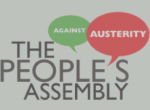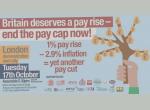"This emergency budget deals decisively with our country's record debts"
Research by PCS shows that between 1918 and 1961 the national debt was over 100 per cent of GDP. Today it is 56.3 per cent.
Our debt is lower as a proportion of GDP than the economies of the US, Japan, France and Germany.
"The richest will pay more than the poorest. Not just in terms of cash but as a proportion of income as well"
Once benefit cuts are considered, the tax and benefit changes announced in the emergency Budget hit the poorest households more than those in the upper-middle of the income distribution in cash, let alone percentage, terms.
"I want an economy where the state does not take almost half our national income, crowding out private endeavour"
Cutting the public sector won't make room for the private sector but will sap demand and weaken the private sector.
The Office for Budget Responsibility recognised this when a leaked document showed cuts of 600,000 public-sector jobs will have a knock-on effect, costing 700,000 jobs in the private sector.
Crowding out, and the other fashion for stamping on inflation, informed Thatcher's early budgets and led to a painful economic slump. It also led to one in five of all manufacturing jobs being lost within 18 months in the early '80s.
"The country has overspent - it has not been undertaxed"
Since 2002, government spending went up at the same rate as government income, until the collapse of 2008. It was collapses in revenues, not rises in spending that caused the deficit to increase.
Spending increased marginally post-2008 because welfare spending increased due to rising unemployment, as a result of the recession.
However there are two reasons for asserting that Britain has been undertaxed.
First there is the UK tax gap of £120 billion in evaded (£70bn), avoided (£25bn) and uncollected (£26bn) tax.
Second, the main income tax and corporation tax rates were cut by new Labour.
Corporation tax was cut from 33 per cent in 1997 to 28 per cent by the time new Labour left office, costing around £50bn by 2010.
"The government can also dispose of assets which should rightly be in private ownership"
Why sell assets that generate revenue? The assets identified were National Air Traffic Management, the student loan book, the Tote and Royal Mail.
NATS reported profits of £78.3 million in 2010, Royal Mail reported profits of £321m in 2009, the Tote reported profits of £156m in 2009. The Student Loan Company received £900m in 2008-9 in loan repayments. Why would any Chancellor lose assets generating annual income in favour of a one-off bonanza?
"We need to do something about the spiralling costs of public-sector pensions"
Public-sector pension costs are not spiralling. The cost of public-sector pensions today is 1.9 per cent of GDP in 2010-11, but by 2060 that will have fallen to 1.4 per cent.
The change to pension calculations from RPI to CPI will save the Exchequer £150bn over the next 40 years.
The 2005 agreement on public-sector pensions between the government and trade unions also cut long-term costs.
"Total welfare spending has increased from £132bn 10 years ago to £192bn today. That represents a realterms increase of a staggering 45 per cent"
In September 2000, claimant count unemployment was 1.035 million. For September 2010, claimant count unemployment was 1.47 million.
So the staggering real terms increase of 45 per cent is not that "staggering" when 42 per cent more people were claiming unemployment benefit.
Welfare spending increased due to rising unemployment, as a result of the recession.
In real terms the value of many benefits fell under new Labour. If jobseeker's allowance had kept pace with earnings since 1997 it would have been worth over £75 per week by 2009. Instead it was just £64 per week.
"The consumer price index not only reflects everyday prices better, it is now the inflation measure targeted by the Bank of England"
CPI excludes housing costs which, since we don't live in a cave-dwelling society, means it does not reflect better the full cost of living, and 30 per cent of pensioners still have mortgage payments outstanding.
RPI also includes council tax, rents and household insurance. Using CPI rather than RPI will mean benefit rates will fall further behind living standards.
CPI is currently 1.5 percentage points below RPI, and has averaged 0.75 below over the last 10 years.
"It is my deeply held belief that a genuine and long-lasting economic recovery must have its foundations in the private sector. That is where the jobs will come from."
The Office for Budget Responsibility stated in June that although the government's cuts would cost 600,000 public-sector jobs, with a knock-on loss of 700,000 in the private sector, the private sector would also create 1.6 million jobs over the same four year period - a net gain of 300,000 jobs.
However, a recent report by Pricewaterhousecoopers estimates that the private sector will only create one million jobs over four years - a net loss of 0.3 million jobs.
from LEAP via the Morning Star
- 2085 reads






